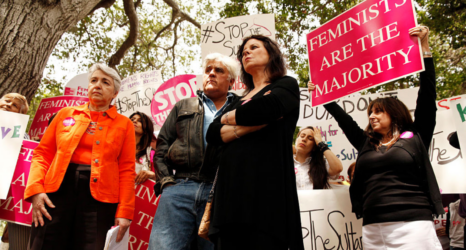A recent survey by Hart Research Associates and All* Above All found that a majority of voters support Medicaid coverage of abortion services. In fact, the number of voters who strongly favor Medicaid coverage increased from 31 percent in 2017 to 38 percent in 2018. Yet abortion access remains under attack—and the fight for reproductive freedom is now headed to the Supreme Court.

Georgia is one of seven states—joined by Alabama, Kentucky, Mississippi, Missouri, Ohio and Louisiana—that introduced strict abortion laws last year. Last week, it also became the latest of six that have now faced temporary blocks from federal judges in implementing such extreme measures.
But these blocks are only band-aids in a judicial landscape stacking the odds against women. “Trump is remaking the judicial branch in order to push these unconstitutional laws forward,” Planned Parenthood director of state advocacy media Bonyen Lee-Gilmore said in a statement, “and we’re seeing these judges stare Supreme Court precedent in the face and create new rules.”
On the campaign trail, Trump promised only to appoint anti-abortion justices who would overturn Roe v. Wade. Neil Gorsuch and Brett Kavanaugh fit that mold—and they’re about to have the chance to shape abortion policy from the bench. Last Friday, the Supreme Court agreed to hear a case challenging a Louisiana law that requires doctors to obtain admitting privileges from a nearby hospital in order to provide abortion care.
The case is very likely to yield an unusually telling decision, reshaping the constitutional principles governing abortion rights, because in 2016, the court struck down an essentially identical Texas law.
A spotlight on the people reshaping our politics. A conversation with voters across the country. And a guiding hand through the endless news cycle, telling you what you really need to know.SIGN UP
The vote in the 2016 decision was 5 to 3, with Justice Anthony M. Kennedy joining the court’s four-member liberal wing to form a majority. It was decided by an eight-member court after the death of Justice Antonin Scalia that February, and since then, Justice Neil M. Gorsuch was appointed to succeed Justice Scalia and Justice Brett M. Kavanaugh to succeed Justice Kennedy.
Alexis McGill Johnson, the acting president of Planned Parenthood, said the court’s ruling could be momentous. “Access to abortion is hanging by a thread in this country, and this case is what could snap that thread,” she said in a statement.
Kavanaugh has already commented that the Supreme Court’s block of this case earlier this year was premature. This TRAP law is part of a larger strategy to incrementally roll back abortion rights, ironically disguised as an effort to protect patients.
“Making people wait and go through hoops of unnecessary, extra procedures does not improve the safety [of abortion,]” Hal Lawrence, CEO of the American College of Obstetricians and Gynecologists, told NPR, “and actually by having them delay can actually worsen the safety.”
According to the Center for Reproductive Rights, this law would leave just one doctor to care for every woman seeking an abortion in the entire state of Louisiana. Abortion advocates have already seen the restriction contribute to women canceling appoints and leaving the state to obtain abortions. Louisiana currently has only three clinics within state lines that offer abortion services, and currently, only one provider in all of Louisiana has admitting privileges.
All* Above All’s recent study confirms that voters can tell the difference between bad medicine anti-abortion laws and legislative actions that actually empower women to have comprehensive health care access. Trump’s appointees would do well to listen to them.





